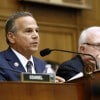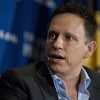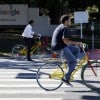Analysis | The Technology 202: Venture capitalists aren’t laughing about Andrew Yang’s ‘freedom dividend’ proposal – The Washington Post

Kamala Harris (L), Andrew Yang (C) and Beto O’Rourke. (Photo by Robyn Beck/AFP)
Ctrl + N
Andrew Yang’s debate-stage announcement that he would give 10 American families $1,000 per month to test his plan for universal basic income sparked Twitter jokes, legal questions and even accusations that the tech entrepreneur-turned-presidential candidate is trying to buy votes. But Yang’s risky strategy resonated with at least one group — venture capitalists.
Alexis Ohanian, the founder of Reddit and managing partner of the venture capital firm Initialized Capital, offered to pay the money out of his own pocket if campaign finance law prevents Yang from using campaign donations to fund the program:
Roy Bahat, the head of venture capital firm Bloomberg Beta, applauded Yang for trying this strategy to raise awareness about universal basic income.
“I think it’s great that a candidate is calling for experimenting, and experimenting with something bold,” Bahat, who focuses on the future of work, told me. “How else can we learn what works?”
The arguments in Silicon Valley are often far removed from what’s taking place on the political debate stage during a presidential primary. But Yang’s unique campaign — which has been compared to a tech startup itself — is acting as a bridge.
The rise of artificial intelligence has permeated almost every discussion in Silicon Valley for years, and venture capitalists have raised concerns that Washington lawmakers aren’t paying enough attention to the seismic shift new forms of automation will bring to the U.S. economy and American workers. Yang is using his time on the campaign trail to put the issue directly in the national spotlight.
His announcement last night ensured the idea got some shine even when campaign moderators were not at all focused on it. Tech issues received nary a mention in last night’s debate, except for a few brief references to intellectual property theft in China.
Yang has built his entire campaign around his central proposal for what he calls a “Freedom Dividend,” or a universal basic income that would provide every American adult with $1,000 per month. The idea of a universal basic income has gained traction in Silicon Valley, where prominent techies like Marc Andreessen and Tim O’Reilly have expressed support for such a system. Some venture capitalists like Bahat are closely watching a pilot in Stockton, Calif., where randomly selected residents are being given $500 a month.
Yang’s campaign has also drawn support from prominent Silicon Valley figures who are developing or investing in the very artificial intelligence Yang is warning could create new challenges for the U.S. economy. Elon Musk, the billionaire executive running Tesla and SpaceX, recently endorsed Yang on Twitter. Yang’s campaign website has an entire page dedicated to tech entrepeneurs and executives that have donated $1,000 or more to his campaign, including former Y Combinator president Sam Altman, Twitter chief executive Jack Dorsey and Twitch co-founder Kevin Lin.
But while Silicon Valley may be taking Yang’s proposals seriously, he faces an uphill challenge in convincing the political establishment. Last night as he unveiled his plan on the debate stage, Mayor Pete Buttigieg responded, “It’s original, I’ll give you that.”
Michael Avenatti, celebrity lawyer and Trump critic, criticized the plan as a gimmick:
And Trump ally and lawyer Rudolph Giuliani slammed the plan and raised concerns about its legality:
The legality of Yang’s plan has come under intense scrutiny as several campaign finance attorneys raised concerns about the sweepstakes-like distribution of campaign funds. Yang’s spokesman told my colleagues that they consulted with an attorney who approved the plan. The payments are considered a campaign expense because they are “being made to further the goals of the campaign, he said.
But other legal experts aren’t so sure. From the nonprofit Campaign Legal Center on Twitter:
Despite the backlash, Yang told ABC reporters after the debate that giving 10 families $1,000 a month is the “most powerful illustration of what this campaign’s all about, which is putting economic resources into Americans’ hands.”
He told reporters voters should take him seriously because they can already see the impact automation is having in their towns, where stores are shutting down because they can’t compete with Amazon. (Amazon CEO Jeff Bezos also owns The Post.)
“I’m talking about very very serious problems and of course they going to get more serious in the days and months to come,” Yang said.
BITS, NIBBLES AND BYTES

Rep. David Cicilline, D-R.I., left, chair of the House Judiciary antitrust subcommittee, speaks alongside ranking member, Rep. Jim Sensenbrenner, R-Wisc., during a House Judiciary subcommittee hearing with representatives from major tech companies, Tuesday, July 16, 2019, on Capitol Hill in Washington. (AP Photo/Patrick Semansky)
BITS: The bipartisan House investigation into competition in the tech industry escalated this morning. Lawmakers asked Apple, Amazon, Facebook and Google to hand over key documents — including top executives’ private communications, my colleague Tony Romm reports.
House Judiciary Committee lawmakers called the companies “to share detailed information about their internal operations, including copies of key communications between top-level executives about potential merger targets and records related to ‘any prior investigation’ they have faced on competition grounds,” Tony writes.
The document requests shed some light on where the lawmakers are focusing as they attempt to understand the unique competition issues with each company, especially because every tech company in the spotlight has a differentiated business model. With Google, lawmakers appear interested in its efforts to dominate search and advertising, requesting records related to its mergers like the purchase of YouTube. With Facebook, lawmakers requested communications in which chief executive Mark Zuckerberg might have talked about the company’s corporate rivals, like the now-shuttered video streaming service Vine.
The companies did not immediately respond to requests for comment.

Mithril Capital co-founder Peter Thiel Photographer: Andrew Harrer/Bloomberg
NIBBLES: U.S. officials, including at the FBI, are probing possible financial misconduct at venture capital firm, Mithril Capital, co-founded by tech billionaire Peter Thiel, Recode’s Theodore Schleifer reports. The investigation represents a rare instance of government scrutiny into the widely unregulated world of venture capital and a potential embarrassment for Trump ally Thiel.
“This federal probe is just the latest — but most significant — problem for the firm, which has increasingly struggled with internal tensions, declining morale, and employee departures,” Schleifer reports. Cambridge Associates, which directed some clients to invest in Mithril, is also looking into the firm’s conduct; investors, which included the MacArthur Foundation and Temasek, have expressed concerns directly to Thiel, who has been relatively silent about the controversy.
“This is a foiled plot by a self-serving ex-employee. There are no allegations from any government agency, or any [investor.],” a Mithril spokesperson told Recode. “Nevertheless, our attorneys are in contact with government authorities in order to protect [investors], employees, and portfolio companies against any extortionate behavior.”

Google employees outside its headquarters (AP Photo/Marcio Jose Sanchez, File)
BYTES: Federal regulators are ordering Google to notify employees of their rights to speak out on political and workplace issues, and otherwise notify employees of a change in rules that had limited sharing of confidential information internally and with the media,” Rob Copeland at the Wall Street Journal reports.
The order settles complaints brought to the National Labor Review Board by former Google employee Kevin Cernekee that he was discriminated against and ultimately fired for his conservative viewpoints and a second, unnamed current employee. Cernekee’s claims drew attention from President Trump, who tweeted his support for the former employee and said he was “watching Google very closely.”
“The NLRB’s settlement is a victory for Google inasmuch as it doesn’t make a formal determination about whether Google was in the wrong,” writes Rob. Cernekee’s request for backpay and to get his job back were not met by the settlement. Both complainants plan to challenge the settlement, Rob reports.
PRIVATE CLOUD

An iPhone displaying apps (AP Photo/Kiichiro Sato, File)
— Apple has amended privacy changes that would have prevented developers who market their apps to children from displaying ads and collecting analytics on their users, my colleague Reed Albergotti reports. Developers originally lambasted the changes to The Post last month, saying they would harm businesses that already had safeguards for child privacy and demonstrated Apple’s unchecked influence over the app industry.
Under the revised rules, analytics software will be permitted if it doesn’t transfer any identifiable user data; advertising will have to be vetted first. The company introduced the original changes in June in response to parent concern, it says. Apple said it would reconsider the rules after the Post reported on the matter.
“We appreciate Apple listening to the kid tech community and developing policies that benefit kids while supporting the growth of responsible developers in this space,” Gerald Youngbold, the developer of a kid-safe YouTube alternative Tankee, said of the changes to Reed.
— News from the private sector:
Square Wants to Be a Bank But Doesn’t Want to Be Taxed Like One
Square has lent billions to small businesses and consumers and applied for a banking license, but it says it isn’t a financial company.
Wall Street Journal
Kickstarter Has Fired Two Union Organizers in Eight Days
It’s the first union effort at a well-known tech company.
Slate
Whole Foods to cut health-care benefits for 1,900 part-time employees starting next year
Less than 2% of its workforce, or 1,900 employees, will no longer be eligible for medical coverage in 2020.
CNBC
YouTube adverts run next to fake cancer cure videos
The video site’s algorithm promotes medical misinformation in a number of languages, the BBC finds.
BBC News
PUBLIC CLOUD
— News from the public sector:
French finance minister wants to block Facebook’s Libra digital currency
France’s Bruno Le Maire said Thursday that he would try to stop the development of Facebook’s new virtual currency Libra within Europe, claiming that “the monetary sovereignty of states is in jeopa…
Politico
Inside the #YangGang’s debate night influence machine
Supporters of the 2020 candidate harness chat groups to help Andrew Yang make the most of his time on stage.
Mother Jones
Facebook penalizes Netanyahu page for hate speech violation
A chatbot function on Israeli Prime Minister Benjamin Netanyahu’s Facebook page has been temporarily suspended after it sent out a message to visitors that violated the company’s policies on hate speech,
The Hill
Google pays France over $1 billion to settle tax case
French investigators have since 2015 been investigating Google’s tax set-up. The company declares profits from activities across the E.U. in one country, usually a low-tax state.
The Associated Press
#TRENDING
— Tech news generating buzz around the Web:
Twitter breaks law to put tweets on San Francisco streets, city says
Twitter is trying to rebrand itself as a safe space by displaying users’ tweets. But its new campaign runs it afoul of the law.
San Francisco Chronicle
Internet Culture
These Dutch vloggers wanted to visit Area 51. They wound up in jail instead.
The two YouTube stars from the Netherlands were arrested after allegedly trespassing outside the government facility famed for conspiracies about aliens and UFOs.
Kim Bellware
— Coming soon:
- The Senate Judiciary Committee will host an oversight hearing on the enforcement of antitrust laws Tuesday at 2:30 p.m. Eastern time
- The Senate Commerce Committee will has a hearing on “Mass Violence, Extremism, and Digital Responsiblity” with representatives from Facebook, Twitter, and Google on Wednesday at 10 a.m.
- The Senate Judiciary Committee will host a hearing to “explore issues relating to competition in technology markets and the antitrust agencies’ efforts to root out anticompetitive conduct” on September 24.
















